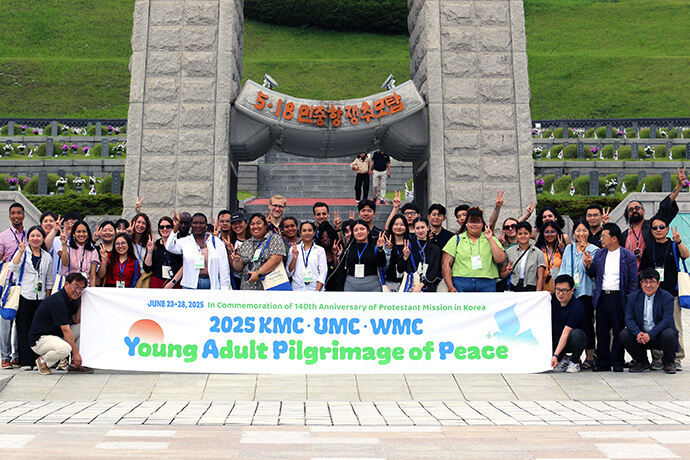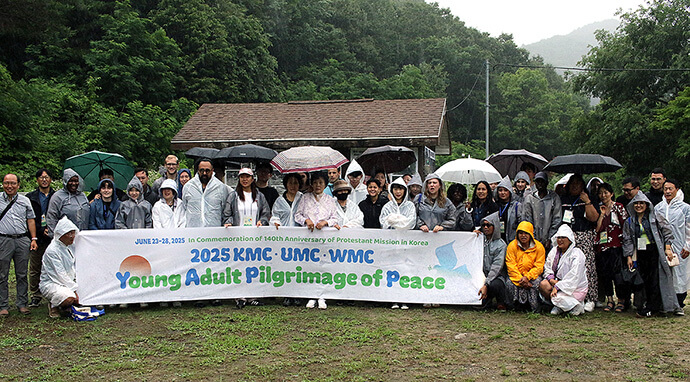Key Points:
- In a pilgrimage organized in part by United Methodists, young adults from 15 countries learned about peacebuilding across South Korea.
- They also heard about the sacrifices made by students working for democracy after South Korea’s military coup in 1979.
- Peace is “not just an absence of violence but a true recognition of one another’s humanity and dignity,” said one pilgrimage participant.
Forty-five young adults from 15 countries across six continents concluded a transformative Young Adult Pilgrimage of Peace in South Korea.
The pilgrimage, which took place June 23-27, aimed to raise awareness about militarization, promote global peace and justice, and deepen Methodist commitments to reconciliation on the Korean Peninsula.
Organized collaboratively by The United Methodist Church, the Korean Methodist Church and the World Methodist Council, the young adults’ pilgrimage built upon the spirit of the 2023 Methodist Roundtable in Seoul and the Korea Peace Night held during last year’s World Methodist Council. It reaffirmed Methodism’s dedication to peacebuilding, reconciliation and solidarity, guided by the principles of justice, peace and life in Christ. The program sought to transform historical wounds and injustices into pathways for peace, celebrate unity and inspire participants to become agents of change.
The participants witnessed the enduring impact of Korea’s 80-year division and explored its complex history.

The pilgrimage coincided with significant anniversaries in 2025, including the 80th anniversary of Korea’s liberation from Japanese colonial rule — an event that also marked the beginning of the peninsula’s division, culminating in the Korean War. Participants directly engaged with pivotal historical sites.
On June 24, in Gwangju, the group visited the May 18 Memorial Park and Hall, reflecting on the sacrifices of the 1980 pro-democracy movement. Leading the first devotion on the bus to Gwangju, Matthew Utley, a student at United Methodist-related Iliff School of Theology, read from Isaiah 2:4 and prayed that communal prayers would become “plowshares of swords that heal the broken parts of our world,” emphasizing that “peace cannot solely be dependent upon prayer.”
A video presentation at the memorial vividly recounted the brutal suppression of the Democratic Uprising and the citizens’ resilient, ethical resistance. On May 18, 1980, the South Korean military violently suppressed nonviolent student demonstrations against the military dictatorship that seized power the previous year.
Briana N. Taylor, from United Methodist-related Boston University School of Theology, shared her reflections following the visit.
“I saw this history of Gwangju as alive and still present,” she told UM News. “It invited me theologically to sit with death in mourning in an attitude of Holy Saturday, instead of rushing through to find new life on Resurrection Sunday.”
Taylor connected the collaborative resistance in Gwangju to her own desire to foster interconnectedness, noting that the absence of looting and aggression in the protests elevated its message globally. She affirmed that peace is “not just an absence of violence but a true recognition of one another’s humanity and dignity.”

On June 25, marking the 75th anniversary of the Korean War’s outbreak, pilgrims visited Gollyeonggol Peace Park, the site of one of the largest civilian massacres during the war.
Jae-keun Lim, Ph.D., from the Education and Culture Center for Peace and Unification, explained that more than 7,000 people were executed and buried there in 1950, describing the site as “the longest tomb in the world.” A 78-year-old daughter of one of the victims, who was 3 years old at the time of the massacre, deeply moved the group by saying, “This will remain the best day of my life, which I cannot forget — because you visited and listened to us.”
L.M., a Palestinian from Nazareth, Israel, expressed a poignant connection to the site.
“I feel a connectedness in the struggle and in the oppression — but also in the solidarity,” she said. Comparing the massacre to daily realities in Gaza, she noted, “These are scenes we see every day in Gaza ... the struggle of families to restore dignity to their relatives.” She offered prayers for an end to violence and for a just, lasting peace in her region and on the Korean Peninsula.
Subscribe to our
e-newsletter
On June 26, the group traveled to Paju and the Demilitarized Zone. Colleen Moore, director of peace with justice at the United Methodist Board of Church and Society, described the DMZ visit as “particularly meaningful due to the diverse experiences of conflict and peace brought by participants from six continents.” She emphasized the urgent need to formally end the Korean War and advocated for renewed U.S.-North Korea engagement. Moore also noted parallels between the Gwangju Uprising and “crackdowns on democracy” occurring globally, highlighting the importance of memory in preventing future tragedies.
Seol-hyun Yoon, a resident near the border, shared a powerful testimony of peace. Following the easing of inter-Korean tensions on June 12, he said, “The fear of war that had lasted for several months disappeared ... and we received hope that we could once again create an opportunity for peaceful reconciliation.”
Throughout the pilgrimage, key themes included solidarity with the suffering, peacebuilding through advocacy and theological reflection, and the transformative power of historical memory. Workshops explored reconciliation, creative activism, and the role of art in peacebuilding.
Stefanie Gabuyo, chair of the World Methodist Council Youth and Young Adult Committee and a member of the planning team, emphasized the importance of truth and reconciliation as steps toward reparation.
“I was deeply moved by the testimony of the Gollyeonggol survivor and by the border resident’s ability to transform hardship into hope,” she said.
Gabuyo, born in the Philippines and raised in Italy, also stressed the need to connect with nature and with people to avoid becoming “numb to the situation.” She added that she is committed to offering online peacebuilding sessions for young people who cannot travel due to visa or capacity limitations. Her own grandfather, a Korean War veteran who later became a United Methodist minister, inspired her journey.
Maggie Taylor, another planning team member and participant in the 2024 Korea Peace Night, reflected on the impact of the experience.
“I was wildly educated on the history of the Korean people and the compassion the global community can express for their struggle,” she said. “It has been transformative to learn with a global group, recognizing the interconnectedness of human experience and the U.S.’s role in Korean history. I feel equipped to advocate for peace on the peninsula. My faith has to push me out of my comfort zone — because if it doesn’t, then I’m not truly living it.”
Hanna Jang, a Korean American and certified candidate for elder in the California-Pacific Annual Conference, found meeting the witnesses at Gollyeonggol especially impactful, calling it “another level” beyond reading history. She committed to preaching messages that “do no harm” and promote justice.
Utley echoed that the week in Korea was likely “the most impactful week of his life.”
The pilgrimage concluded in Seoul on June 27 with a visit to the Yanghwajin Foreign Missionary Cemetery. There, the Rev. J.C. Park, former president of the World Methodist Council, and the Rev. Byung-Bae Hwang, top executive of the General Board of Missions of the Korean Methodist Church, delivered messages. They congratulated and honored the pilgrims’ efforts toward peace in the world.
Park urged them to “follow the law of life even though we are living in the midst of the law of death of the world.”
Hwang concluded, “The spirit of peace and the bonds of solidarity we witnessed in Korea will continue to live on.”
In their collective “Message to the Methodist, Wesleyan, United and Uniting Churches in the World Methodist Council,” the young pilgrims invoked Joel 2:28, calling for the pouring out of God’s spirit.
They described the pilgrimage as confronting the “contextual reality from the democratization movements towards the hope for the reunification of the Korean Peninsula” and witnessing “the devastation caused by warfare and political tensions that have persisted for 75 years.”
They stated their commitment “to carrying one another’s burdens and to journeying as disciples of Christ,” urging churches to “challenge injustice, embody Christ’s healing presence, and live as witnesses to the God who unites and connects us all.” They called for synodal processes of mutual listening, acknowledging “social and geopolitical challenges are increasing mistrust and radicalization within our communities.”
They pledged to “trust God towards intergenerational listening” and to confront “the ghosts of the past cold war, imposed public enemies and demonization of all otherness.”
The young Methodists concluded their message with a collective poem, “We Build Peace When ...,” articulating specific actions.
“We Build Peace When …”
A Collective Poem by Methodist Youth
We build peace when we we’re talking together
We build peace when we remain fervently committed to one another
We build peace when we learn to live through our differences
We build peace when we use privilege for the benefit of others
We build peace when we have justice!
We build peace when we build and participate in diverse communities
We build peace when we preach
We build peace when we share food
We build peace when we learn from each other.
We build peace when truth is revealed, and every voice has the space to speak
We build peace when we face each other’s difference straightforward
We build peace when we engage with curiosity
We build peace when eating together at a table.
We are courageous despite our fear
We build peace when we plant seeds of hope in areas where violence has been inflicted
WE BUILD PEACE WHEN WE START LISTENING
We build peace when we recognize each other’s humanness
We build peace when our fear of something going wrong stops preventing the possibility of
something going right.
Peace is built yesterday for tomorrow
We build peace when humanity is restored to those without power
We build peace NOW
Love is the thread that binds,
Peace, the path we walk together
Together they are always a blessing.
We build peace when we tell the truth
We build peace when everyone is equal
We build peace when we hold hands
We build peace when we struggle!
We build peace when we weave together stories, struggles, and hopes.
We build peace when we are empathetic
We build peace when we take that first bold step —
We build peace when we learn to accept our interconnectedness as God’s creation
We build peace in radical hospitality, service and love for all.
Kim is director of Korean and Asian news at United Methodist Communications. Contact him at 615-742-5470 or [email protected]. To read more United Methodist news, subscribe to the free Daily or Weekly Digests.




